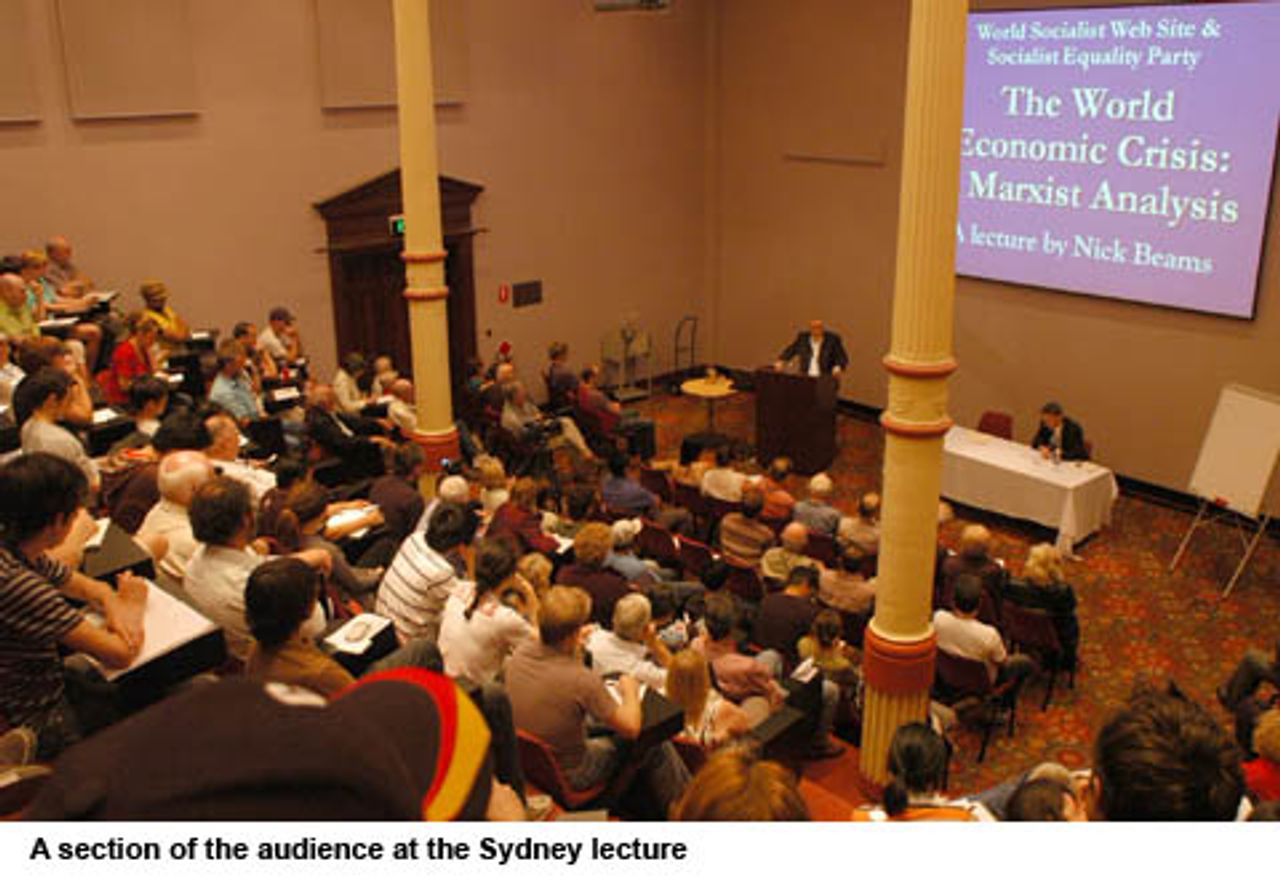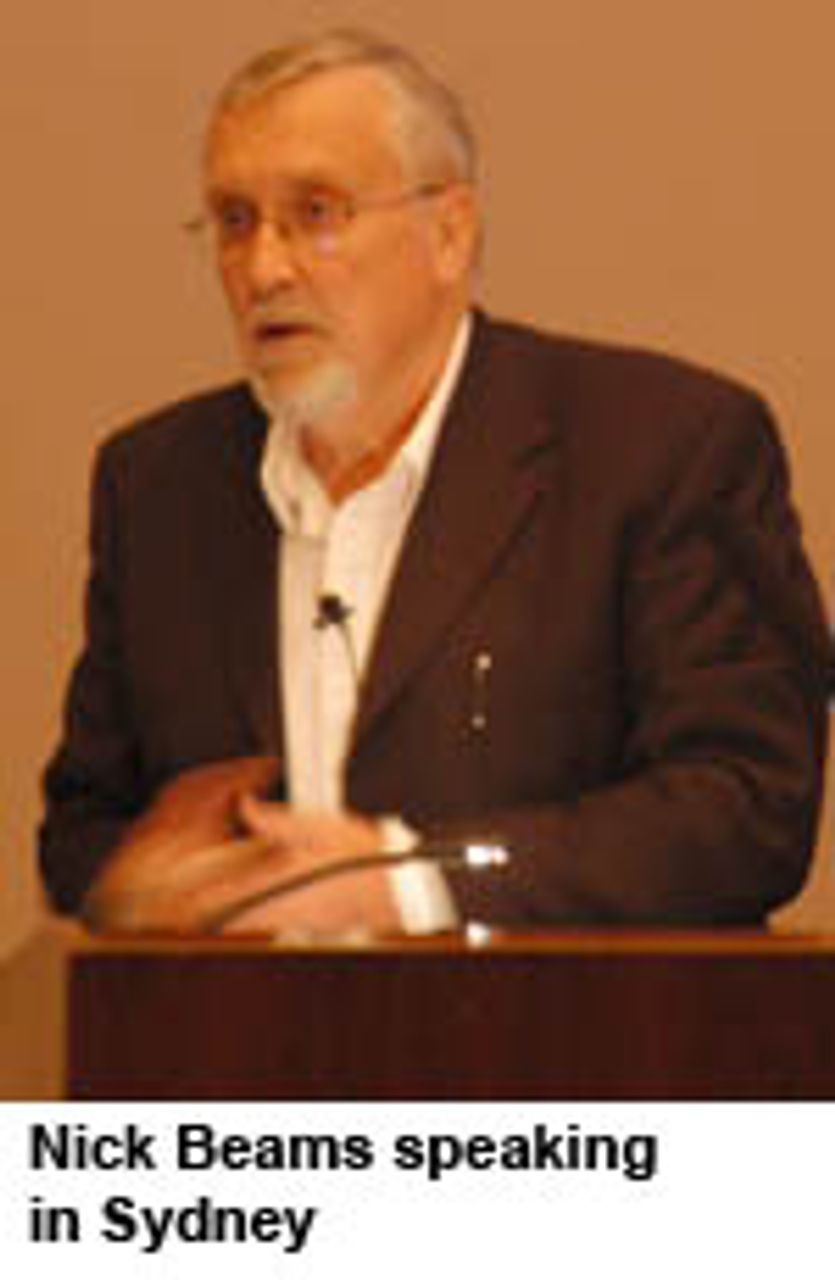Nick Beams, a member of the World Socialist Web Site International Editorial Board and national secretary of the Socialist Equality Party (SEP) in Australia, delivered a powerful series of lectures on "The World Economic Crisis—A Marxist Analysis" in Perth, Melbourne and Sydney over the past two weeks. The lecture tour concluded yesterday with a near-capacity audience in the Australian Museum lecture theatre in central Sydney.

A broad range of people, including university and school students, workers, retirees, professional people and academics, of many different nationalities, attended in each state. Many were regular readers of the WSWS; others had come as the result of SEP street campaigns, posters and advertisements. Collections for the SEP's monthly fund raised over $4,500 and many copies of Marxist works were purchased.
In his two-hour lecture, which will be published in full on the WSWS over coming days, Beams explained the historical origins of the global financial meltdown and the reasons it had deepened into the most serious breakdown of world capitalism since the Great Depression of the 1930s.
The lecture began by examining various indices of the scale of the crisis, such as the Bloomberg News estimate that the US government had, by November 24, poured some $7.76 trillion, or the equivalent of half the US Gross Domestic Product, in unsuccessful attempts to stem the downward spiral. That figure, Beams pointed out, did not include subsequent bailouts, such as those of the mortgage companies Fannie Mae and Freddie Mac and the auto industry.
 Beams commented: "One reads these figures and the question arises: who is going to bail out the United States?
Beams commented: "One reads these figures and the question arises: who is going to bail out the United States?
"Stock markets around the world have tumbled with an estimated $25 trillion having been erased from the value of shares worldwide in the past six months. Around 38 percent of the value of major companies has been wiped out. General Motors, once the most powerful industrial concern in the world, teeters on the edge of bankruptcy.
"According to official statistics, all the major areas of the world economy are now in recession: the United States, the eurozone, Britain and Japan.
Beams emphasised, however, that the economic crisis did not consist simply of massive financial losses. Rather, it marked the disintegration of the entire free market program that had formed the framework for the course of world capitalism over the past three decades.
The lecture established that the roots of the crisis—and the inability of world leaders, including at the recent G20 summit, to agree on any serious unified measures to combat it—lay in the fundamental contradictions wracking the global capitalist system. First, was the continuing division of the world economy into rival nation-states. Secondly, while production was socialised, the wealth created by the labour power of hundreds of millions of workers was appropriated for private profit through the system of wage labour—a contradiction that manifested itself in the tendency of the rate of profit to fall.
After explaining to the audience some of the "ABCs of Marxism" that formed the basis for his analysis, Beams traced the rise in the mountain of debt used to finance operations by the financial markets over the past three decades. Drawing on the analysis made by Karl Marx 150 years ago in Capital, he explained why it was impossible to separate this "bad" side of capitalism—which Marx called fictitious or imaginary capital—from the supposed "good" side of productive capital.
Displaying a series of graphs, the lecturer probed the growth of unprecedented levels of debt leveraging. Giant merchant banks like Goldman Sachs, for example, were holding only $30-40 billion in equity for over a trillion dollars in assets. He explained that such leveraging was bound up with the establishment and meteoric rise of financial derivatives in the aftermath of the collapse of the Bretton Woods fixed currency system in 1971. The vast array of derivatives—from currency swaps to interest and credit default swaps, accompanied by options trading and the packaging of debt into securities—had been necessary to cope with the increased uncertainty and risk generated by the demise of the fixed currency regime.
Of course, like every other financial asset, derivatives had become a means for speculation, with disastrous consequences. But, Beams emphasised, "simply to focus on this is to ignore the fact that they arose as a means to try to overcome objective contradictions in the capitalist economy caused by the breakdown of the previous system of regulation".
The speaker concluded by drawing the political implications of the meltdown. The explosive contradictions of capitalism had produced a new period of social revolution in which the fate of the working class and humanity as a whole would be decided: without socialism there would be economic catastrophe, war and barbarism.
Beams sharply differentiated the perspective and program of international socialism developed by the International Committee of the Fourth International from the policies advanced by various neo-Keynesian reformers and radical tendencies. All these tendencies displayed a profound faith in the permanence of the capitalist order, either by downplaying the significance of the global crisis or insisting that it would be overcome through the introduction of a series of regulatory mechanisms. And all of them denied that the working class was capable of carrying forward a socialist program.
Quoting the words of Leon Trotsky in preparing for the founding of the Fourth International in 1938, Beams said the task of the revolutionary party was to base itself not on the present level of consciousness in the working class, but on the acuteness of the objective crisis. The outcome, he insisted, would be determined in the class struggle, in which the revolutionary party, the ICFI, would play a critical role.
"Globalised production has created a global working class whose material interests are determined by the struggle against global capital," Beams emphasised. "The program for the unification of the working class is the world socialist revolution: that is, the overthrow of the capitalist ruling class and the development of a planned world economy based on the democratic decision-making of the world's producers."
There were many questions after each lecture. In Perth, they included the collapse of Iceland's economy, the source of the funds for the government bailouts, the impact on superannuation and pension schemes, how a socialist government would organise economic life and the danger of climate change destroying the planet.
In Melbourne, there were questions about the viability of the US auto giants even if they received the requested bailout, whether the Wall Street bailout would provide the financial system with some "breathing space", on the relationship between war and the crisis of capitalist accumulation, on the mathematics behind options trading, and the apparent contradiction between the IMF austerity instructions for underdeveloped economies and the stimulus programs being promoted in several advanced capitalist countries.
An important discussion followed two questions: one on the failure of the post-World War I German revolution and the isolation of the Russian workers' state, and the other on the method for determining when a revolutionary situation had developed. Responding to the questions, Beams stressed the fundamental contradictions that drove the capitalist system's crisis. "These objective forces are far more powerful than the present political confusion... We have to arm and prepare the working class with revolutionary leadership—we have to complete the last link in the chain."
In Sydney, the questions included the role of financial derivatives, how surplus value was extracted from the labour power of the global working class, the irrational character of belief in the market system, what would happen next in the struggle between the US and its global rivals, and whether Islamic finance provided any alternative.
In his replies, Beams emphasised that the "madness" of capitalism was not a mental problem, but resulted from the irrationality of the social structure itself, which was not under conscious human control. Amid the dangers of world war, with the US ruling class resorting to military means to try to retain global dominance, and against efforts to divide working people along religious lines, it was essential to unify the international working class on a socialist program to abolish capitalism itself.
